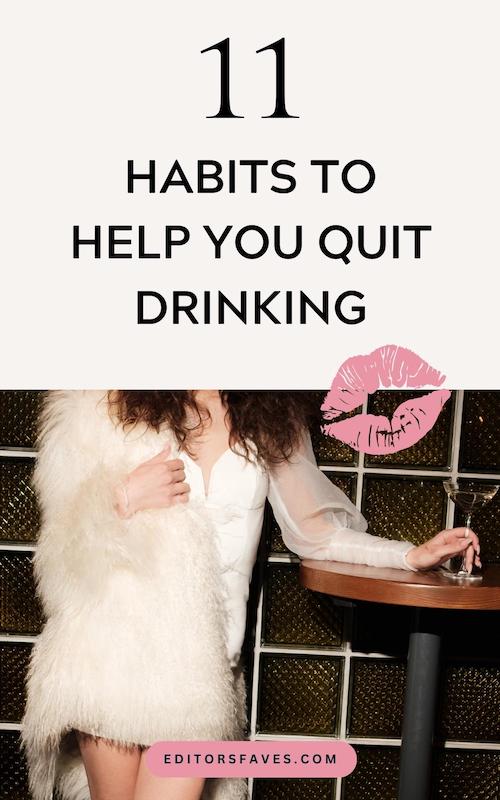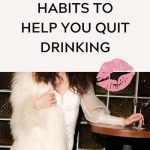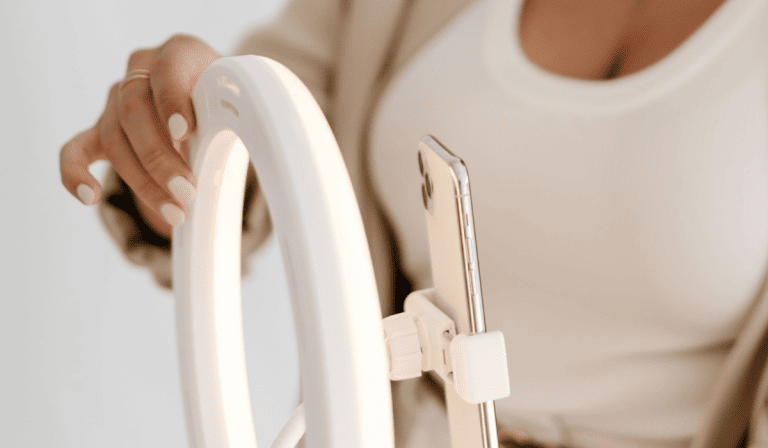11 Habits To Help You Quit Drinking Alcohol

Ready to quit drinking alcohol? Congratulations! I have some tips for how you can develop habits that build long-lasting mental strength to make staying away from drinking easier.
When you go to quit drinking alcohol, it’s worth remembering that it will take time and you’ll need to be patient with yourself.
But the truth is you deserve to live a happy, healthy life.
Here are some habits that can help you quit drinking alcohol (it worked for me and I haven’t had a drink in many years!)
As an affiliate partner of various brands and sponsored content, we may earn commission on qualifying purchases. Disclaimer | Advertise With Us
Habits to Help You Quit Drinking Alcohol

There will always be plenty of temptations to continue to drink – hanging out with friends, having a “good time”, bonding with coworkers – but there comes a time when you’ve simply had enough.
Alcohol is not good for you, everyone knows that, but giving it up can be a really tough feat.
Whether you’re struggling with alcoholism, trying to live a healthier life, or simply sober curious, you CAN accomplish this goal.
1. Set Clear Goals
It should surprise no one that goal setting is key when it comes to starting any transformative journey, including quitting drinking.
Understanding your “why” is crucial to success.
There are plenty of things an alcohol-free lifestyle can do:
- Improve your mental health
- Improve your physical health
- Mend strained relationships
- Improve your cash flow
… But not all of those will resonate with you.
By writing down the reasons that are propelling you toward this goal, you create a tangible reminder of your commitment.
For me, the fact that alcohol causes cancer was a big one. Also, when I started questioning alcohol in my life, I was planning to start a family, and felt I was just in a new chapter in my life where drinking simply no longer fit.
Becoming a mom was the biggest “why.”
Those things gave me a reason to quit. But the thing that kept me sober was a few years ago when I had a non-religious spiritual awakening, when I realized that I could connect with my guides and higher self much better without alcohol blocking the connection!
A nice bonus result of not drinking is that I look visibly younger and healthier now, than I did 10 years ago.
Beauty is another great motivator to ignore the temptation to drink.
Your goals list and the reasons behind them can serve as a motivational tool, especially during challenging times.
Revisit and reflect upon these goals regularly. Over time, as you see the benefits of your decision, these reasons can further solidify your commitment to an alcohol-free life.
2. Avoid Triggers
Triggers aren’t just for Facebook posts, they can throw a serious wrench in your journey to quit drinking alcohol.
These are specific cues that can prompt a craving or desire to drink. For some, drinking also leads to trigger the desire for other substance use.
These can be deeply personal and vary from individual to individual.
For some, it might be a particular group of friends with whom drinking was a regular activity.
For others, it could be certain establishments, events, or even emotional states.
Recognizing these triggers is the first step. Once identified, proactive measures can be taken to avoid or replace them.
Honestly, this could mean developing new friendships, seeking alternative entertainment venues, or adopting coping mechanisms for stress that don’t involve alcohol.
Over time, as you distance yourself from your triggers, their power to influence your behavior diminishes.
3. Trick Your Brain With Your New Identity
The amazing thing about our brains is that they will believe anything we tell them.
And one of the strongest ways to break a bad habit is to create a new identity for yourself, and tell your brain its true. (Even if you don’t fully believe it yet!)
Start telling your brain things like:
- “I am sober and I love it.”
- “I love non-alcoholic drinks”
- “It’s easy for me not to drink”
- “I am not a drinker”
- “I am not someone who drinks alcohol”
- “I don’t like [insert substance]”
- “I don’t feel any pressure to drink.”
Simply affirm it by thinking these phrases or saying them out loud. Pretty soon this identity will become a reality.
Once you have adapted your new healthier identity, it will be very hard to go back to the old you.
- Whitaker, Holly (Author)
4. Replace the Habit
Habits are deeply ingrained behaviors that operate almost on autopilot.
When you remove a habit, such as drinking, it’s beneficial to replace it with a new, positive behavior. This prevents a void that might lead you back to the old habit.
Consider activities that are not only enjoyable but also contribute to your well-being.
Engaging in physical exercise can release endorphins, natural mood lifters. Reading can provide an escape and expand your knowledge.
Picking up a new hobby, like painting or playing a musical instrument, can be both therapeutic and fulfilling.
Even simple activities, like walking, can offer time for reflection and appreciation of your surroundings.
For 7 years I worked at a corporate office by day and as a bartender in dive bars by night.
Drinking was just a normal part of both my day and night jobs. It didn’t take long until I had developed the habit of drinking and didn’t even realize how bad it was, because all of my coworkers were doing the exact same thing.
Something that really worked for me was realizing that I was chasing the feeling of dopamine, rather than the drink or the social situation itself.
So replacing the habit of going out drinking with something else that gave me the same “high” was key. For me, it was starting a business, and chasing the high of sales and entrepreneurial success.
Reading Atomic Habits is VERY helpful! Highly recommend:
These new habits can become as ingrained and automatic as old habits, leading to a healthier, more balanced lifestyle.
5. Stay Hydrated
Hydration is pivotal for your overall health. But when you quit drinking alcohol it becomes even more essential.
As you withdraw from alcohol, your body will likely experience certain levels of dehydration which your brain can misinterpret as a craving, instead of what it really is
By staying hydrated, you can potentially reduce these false cravings. Not to mention, water aids in flushing out toxins, including those from alcohol, helping in the detoxification process.
- YOUR DREAM TUMBLER: Whichever way your day flows, the H2.0 FlowState tumbler keeps you refreshed with fewer refills. Double wall vacuum insulation means drinks stay cold, iced or hot for hours. Choose between our 14oz, 20oz, 30oz,40oz and 64oz options depending on your hydration needs. The narrow base on all sizes (except 64oz) fits just about any car cup holder, keeping it right by your side.
Keeping a water bottle handy and setting reminders to drink can be effective strategies to ensure you stay hydrated.
6. Seek Support
The journey to quit drinking is often fraught with challenges. Having a support system can make a significant difference.
Groups like Alcoholics Anonymous or SMART Recovery offer structured programs and a community of individuals who are going through or have gone through similar struggles.
These groups provide a safe space to share experiences, learn from others, and gain encouragement.
The collective wisdom and camaraderie found in such groups can be a source of strength, especially during moments of doubt or temptation.
Remember, there’s no shame in seeking help, it’s a sign of strength and commitment to your well-being.
7. Stay Accountable
Accountability is a powerful motivator. Sharing your goal to quit drinking with trusted friends or family members creates a sense of responsibility.
These individuals can serve as your personal cheerleaders, celebrating your milestones and helping you navigate challenges.
Knowing that someone is aware of your goal and is rooting for you can deter you from giving in to temptations.
Regular check-ins with these accountability partners can provide both encouragement and a platform to discuss any struggles or setbacks.
Their perspective and support can be invaluable in reinforcing your commitment.
- Warrington, Ruby (Author)
There have been times when I’m flying somewhere and I’ll think “I could just have one glass of wine on this flight, it’s complementary in business class after all…”
But I catch myself and am instantly reminded of how I told my best friend, my husband, and my TikTok followers that I don’t drink. I wouldn’t want to let any of them down. So I don’t let myself slip.
8. Educate Yourself
The more you understand about the effects of alcohol on your body and mind, the more informed your decision to quit becomes.
There are plenty of resources out there from documentaries to scientific studies that detail the short-term and long-term impacts of alcohol.
This includes its effect on the liver, brain, heart, and even its role in mental health issues.
By immersing yourself in this knowledge, you’re not only reinforcing your decision but also equipping yourself with facts that can be shared with others or used as reminders when faced with temptations.
An educated choice is often a more resilient one.
Read: Self-improvement books every woman should read before turning 30.
9. Practice Stress Management
Stress is a common trigger for many who turn to alcohol as a coping mechanism.
But relying on alcohol can lead to a vicious cycle where the initial relief is followed by increased stress, guilt, and dependency.
It’s essential to find healthier alternatives. Not sure what those could be? Here are some common practices that can help you while recovering (and beyond):
- Meditation for clarity and calmness
- Yoga combines physical postures with mindfulness, promoting physical and mental well-being
- Deep breathing exercises which can be quick and effective in diffusing immediate stress
- Journaling for an emotional outlet
And these are just the tip of the iceberg. There are plenty of practices that can help you manage and reduce your stress.
Over time, they can become your go-to response, reducing the allure of alcohol.
- 【320 PAGES&100GSM THICK PAPER】Large A5 size (5.75″x 8.38″/146mm x 213mm), 7mm space classic college ruled notebook, total 320 pages, include 312 numbered pages (27 lines on each page) /156 sheets to provide you ample space to write. 100gsm acid free light Ivory paper that is thicker than normal, will not cause bleeding, ghosting or smudging and is suit for most types pens.
10. Reward Yourself
Positive reinforcement can be a powerful motivator.
In fact, studies have shown that while both negative punishment and positive reinforcement can provide behavior changes, those made with positive reinforcement are more likely to last.
With that in mind, set clear milestones AND celebrating them can boost your morale. It doesn’t matter if you celebrate a week, month or year, it can all contribute to your growth.
Rewards don’t have to be extravagant, but they should be meaningful for you.
They’re there to serve as a reminder of your progress, and the benefit of your commitment.
11. Seek Professional Help
Personal determination is crucial but addiction is complex, and seeking professional help does not equal failure.
Therapists, counselors and psychologists who specialize in addiction have the right training and experience to offer guidance that’s tailored to your specific situation.
From coping strategies to insights into underlying triggers, they can help equip you with the tools you need to quit drinking alcohol.
Beyond the simple practicality of their help, they can also offer a safe, non-judgmental space to discuss your challenges, fears and progress.
For some, group therapy or a rehabilitation center might be able to provide you with the benefits and structured program you need.
Can you really quit drinking?
Yes, you can absolutely quit drinking.
It’s not an easy feat, and you’ll want to be patient and loving with yourself as you head through this journey.
Quitting the habit of drinking is NOT a sprint, it’s a marathon, and building healthy habits can help you quit drinking and improve your overall life.
If you find yourself struggling with this or you simply don’t know where to start, it’s OK.
Consider talking with your doctor or a therapist, they can help you get started (and stay) on the right path.
@herpaperroute Healthy habits and mindset shifts that can help you quit drinking and glow up. #quitdrinking #soberlife #sobertok #sobercurious #sobercomedy #healthyhabits #habits #Linecookenergy #bartenderstories #glowup ♬ original sound – Chelsea | HerPaperRoute














